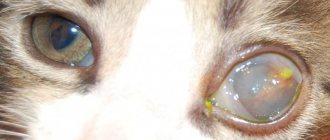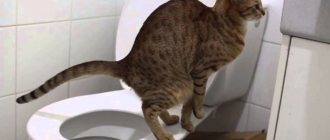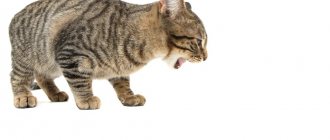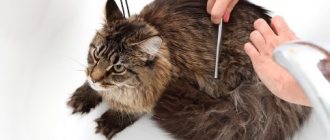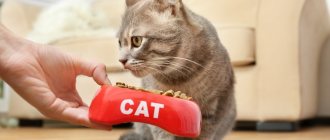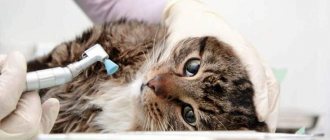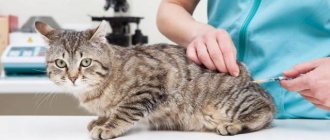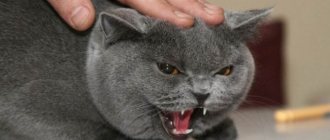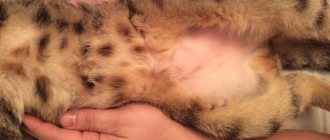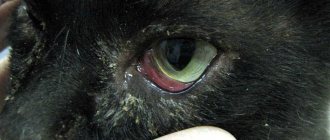Causes of bloating in adult cats
If your cat has a swollen belly and sides, possible causes may include:
- disturbances of intestinal microflora;
- inflammation;
- swelling;
- internal bleeding;
- tumors;
- parasites.
Bloating in a cat does not bode well.
Important! Only a doctor can make an accurate diagnosis after taking blood, urine and stool tests. If necessary, an ultrasound is performed.
Accumulations of air and gas
Aerophagy is the swallowing of air during food consumption. If your pet eats food particularly greedily, air gets in, forming bubbles inside.
Another common cause is excess gas production in the intestines. Most often it is associated with an incorrect or unbalanced diet. Foods that can cause bloating:
- fat and other meat waste;
- bread;
- milk;
- dairy products;
- feed with high soy content;
- wheat;
- corn.
The first three products are prohibited from being given to kittens and adult cats. Most dairy products cause flatulence in a kitten. The consumption of the rest should be halved. The accumulation of gases is caused by any spoiled food. Within the normal range, increased gas formation continues for 1-2 hours after eating, and then goes away.
Note! Bloating can be a sign of inflammatory diseases of the gastrointestinal tract, in particular intestinal diseases. If an enlarged tummy is accompanied by symptoms such as vomiting, diarrhea, refusal to eat, apathy and weakness, you should immediately take the animal to a veterinarian.
Fluid in the abdominal cavity
If your cat's stomach is bloated and his health is rapidly deteriorating, the problem may be fluid accumulation:
- urine;
- blood (internal bleeding);
- pus and exudate.
Stagnation can be triggered by injury, severe infection, or organ disease in the acute stage.
Overweight
Excess weight alone cannot cause bloating in a cat. The reason is a disruption in the functioning of the gastrointestinal tract. Often, abundant or unhealthy nutrition causes an imbalance of microflora.
As in people, it manifests itself as heaviness in the stomach, flatulence, and the intestines begin to growl. The number of good bacteria responsible for fermentation and digestion of food is reduced, and the bad bacteria that provoke putrefactive processes in the intestines increases.
Obesity itself is not the cause of a bloated belly.
Enlargement of any abdominal organ
In the presence of an inflammatory process, organ tissues can swell 2-3 times. Your pet's belly may swell due to inflammation or swelling of the liver, spleen, or kidneys.
Helminthiasis
A hard, distended belly is one of the signs of helminthiasis (infection with worms). In especially advanced cases, the number of parasites can be in the hundreds, which means additional weight and volume in the abdominal area. Prevention of infestation with medications should be carried out once a season, especially if the cat is often outdoors and in contact with other animals.
Important! Kittens born on the street become infected with helminths from the first days of life. Due to the ball of parasites, the animal's abdomen swells.
Enlargement of the uterus during pregnancy
Bloating in a pregnant cat causes the uterus to become enlarged. In most cases, changes in organ size occur within the normal range. A veterinarian can determine whether the size of the uterus corresponds to the animal’s gestational age.
Tumor
Malignant and benign tumors partially displace organs. In addition, tumors reduce the overall immunity of the body. Only a specialist can diagnose them using ultrasound and other techniques.
For your information! A condition when an animal can only lie down and sleep indicates the last stages of oncology.
Peritonitis
Another reason why a cat's stomach is swollen is peritonitis. This is a dangerous inflammation in the abdominal cavity. It is characterized by purulent and bloody discharge, as well as the outflow of fluid into the abdomen. The area becomes swollen and inflamed. Most often, the cat cannot even walk, eat or drink.
Peritonitis is common among older and recently born cats. In the second case, sterilization is recommended to prevent recurrent peritonitis. An advanced disease leads to irreversible inflammatory processes, internal bleeding, severe swelling, and organ ruptures.
Ascites
If a sick cat has a distended belly, ascites may be the cause. This is the release and accumulation of fluids in the abdominal cavity. Ascites occurs when any disease reaches an incurable stage. Most often, fluid accumulation occurs due to diseases of the gastrointestinal tract and genitourinary system. Modern medicine is not yet able to treat ascites. To alleviate the animal’s condition, the organ that caused the ascites is removed.
What to do:
- in all cases of abdominal enlargement, it is necessary to consult a doctor, regardless of the age of the animal - there are no options for “it will resolve on its own”!
– the faster the belly enlarges, the more urgent it should be to see a doctor. If there is a simultaneous significant deterioration in your health, you must go immediately to the clinic, where an ultrasound/X-ray and, if necessary, surgery can be performed.
– to independently monitor the amount of fluid in the abdominal cavity, you can use weighing + measuring the volume of the abdomen with a centimeter tape. Nevertheless, primary importance when choosing treatment tactics is given to the general condition of the animal and the degree of tension in the abdominal wall, and not to weight/volume.
Symptoms
Seizures in a cat: causes, what to do, treatment
In most cases, bloating in a domestic cat signals the progress of the disease. To determine the nature of the bloat, you need to monitor other symptoms, as the veterinarian will need this information.
Sharp enlargement of the abdominal cavity
A sharp and strong increase in the abdomen indicates that it is not a matter of nutrition. Urgent hospitalization of the animal is required if the skin in the abdominal area is extremely stretched and the lower ribs are spread apart.
Inflammatory processes in the oral cavity
Inflammation in the mouth or other mucous membranes is a sign of exacerbation of the disease. Inflammations with purulent formations or severe swelling are especially dangerous.
Weight loss
If your cat has a bloated belly accompanied by weight loss, you should immediately take the cat for an examination. The most harmless reason for losing weight is worms. If your pet refuses to eat or loses weight, cancer may be the cause.
Presence of vomiting or diarrhea
Most often, diarrhea is a manifestation of problems with the gastrointestinal tract. Loose stools are formed due to weakened intestinal functions (decreased immunity, infections, etc.). Frequent trips to the toilet may be a consequence of poisoning or inflammatory processes in the digestive organs.
Vomiting is a clear signal that your pet’s body is fighting the disease. In this case, they must be accompanied by vomiting. Urging without vomiting indicates serious problems.
Decreased activity
An unusual decrease in activity is almost always a bad sign. An exception may be particularly hot days. At other times, apathy in a cat is a sign of deteriorating health. Often in such cases, cats strive for privacy and begin to growl if you approach them.
Excessive salivation
Constant swallowing, a wet neck and chin are a sign that the salivary glands have begun to work especially actively. The body tries to remove the infection through saliva. In addition, strong salivation provokes dehydration. Therefore, if, when bloated, the cat begins to breathe frequently and secrete a lot of saliva, you should immediately go to the veterinary clinic.
Excessive drooling in a cat is one of the key symptoms that you should definitely tell your doctor about.
Treatment methods
If a cat has a swollen belly, what should the owner do at home:
- palpate gently. The stomach should not be rock-hard, and touching should not cause painful sensations in the animal;
- remember what the pet ate and what medications the pet took over the past 3 days.
The cat's hind legs have failed: causes and treatment
If the animal remains active, can go to the toilet without problems and does not experience problems with bowel movements, it does not need to be taken to the clinic right away. However, in the following days, it is necessary to closely monitor the general condition of the cat and the degree of bloating in its abdomen.
Important! When a cat has a bloated stomach, many owners try to help and give a massage, but this is prohibited. If the cause is inflammation or fluid effusion, massaging the tummy will greatly aggravate the condition.
Nutrition correction
A bloated belly in a domestic cat can be treated with proper nutrition. The number and size of portions is calculated by the veterinarian based on the weight and age of the animal. If your pet eats ready-made food, you should pay attention to options for cats with gastrointestinal diseases or sensitive intestines.
Cats eating homemade food need to include boiled or baked vegetables (zucchini, peppers, tomatoes), fat-free meat and plenty of fresh water in their diet. You can add dietary supplements with natural fiber, which normalizes the functioning of the digestive organs.
Note! If your pet has a habit of eating food, you need to block access to the trash can and hide all food from the table.
Drainage of fluids from the abdominal cavity
If the condition is severe, the cat will need a drainage system, which is installed at the veterinary clinic. Drainage tubes are inserted into the abdominal cavity and excess fluid or blood is removed through them. The system is installed for several days. As a result, the amount of liquid collected per day should not exceed 50-100 ml. After this, the drainage is removed.
Diuretic
Diuretics remove excess fluid from the body through urine. Such treatment should be carried out under the supervision of a physician. Firstly, it puts a lot of stress on the kidneys. Secondly, with long-term use, diuretics wash out potassium and other elements, and also increase blood pressure.
Surgery
Internal bleeding, tumors and tears can be corrected with surgery. The sooner the owner consults a doctor, the easier it is to prevent the consequences of the disease.
Surgery is required as a last resort
Abdominal bloating in a domestic cat is not always a sign of illness. If the stomach is swollen for the first time, it is soft and touching does not cause pain in the cat, the cause may be improper nutrition or swallowing air. Symptoms such as general weakness, vomiting and diarrhea, a hard and hot stomach are dangerous and indicate an aggravated pathology. In this case, you should immediately take the cat to a veterinarian for examination.
Types of sterilization, the appearance of a lump on the stomach
Sterilization is a surgical operation that is aimed at extinction, preventing sexual estrus and reproductive functions in females. The operation is performed in a clinic or at home under general or combined anesthesia.
If the owners of furry pets follow all the instructions and recommendations of the veterinarian and provide proper care, the rehabilitation period takes on average about 10-14 days, after which the cat recovers and gradually returns to its normal life.
- Sterilization of females is a cavity operation (classical method). The incision is made along the white line of the abdomen.
- Laparoscopy is also practiced, in which special equipment (laparoscope) and a lateral incision are used. The latter option involves dissecting the tissue from the side without damaging the muscle fibers (the muscles move apart along the path of the scalpel).
Important! Laparoscopy is the most gentle technique; after surgery, complications rarely arise due to the absence of external sutures.
The most traumatic surgical intervention can be called the classical method of sterilization. After such an operation, the cat needs special care and attention. In addition, postoperative complications cannot be excluded.
After abdominal surgery, a cat may develop a lump or lump-like growth on its abdomen. The swelling (soft, hard) is localized in the area of tissue dissection on the abdomen under the skin or under the suture. This can be caused not only by surgery, but also by diseases of the internal organs that worsen after the procedure.
Let's look at what this means and whether you should worry about it.
